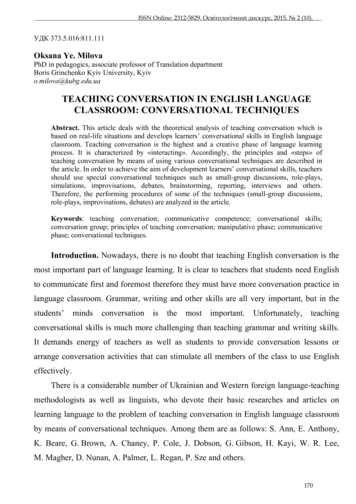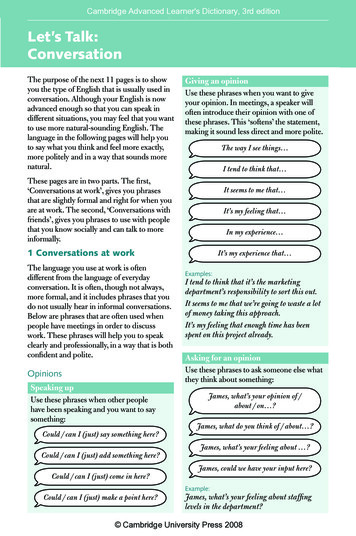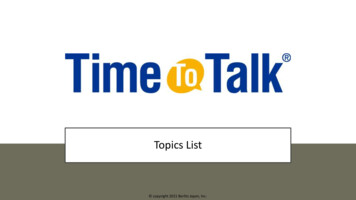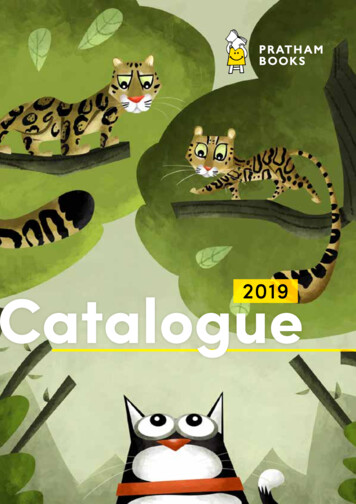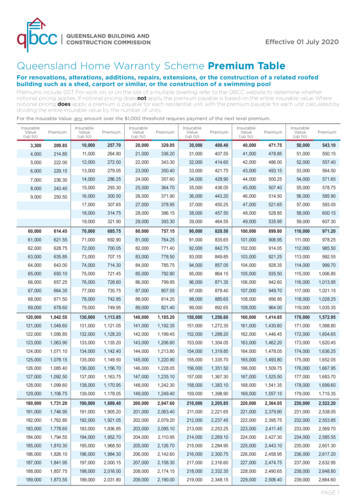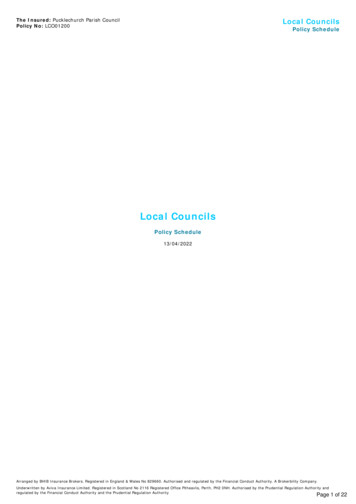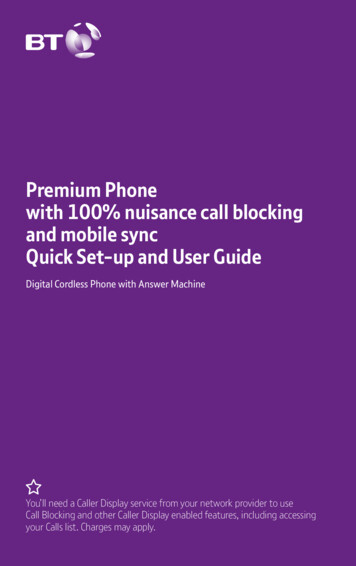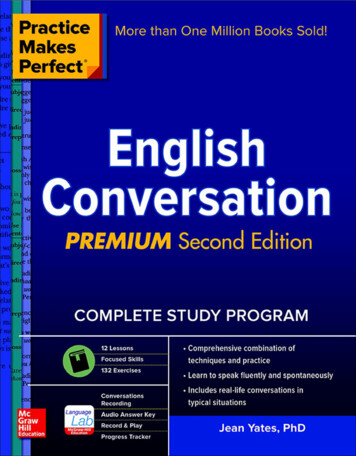
Transcription
PRACTICEMAKESPERFECT EnglishConversation
PRACTICEMAKESPERFECTTMEnglishConversationPremium SECOnd EditionJean Yates, PhDNew York Chicago San Francisco Athens London MadridMexico City Milan New Delhi Singapore Sydney Toronto
Copyright 2016 by McGraw-Hill Education. All rights reserved. Printed in the UnitedStates of America. Except as permitted under the United States Copyright Act of 1976,no part of this publication may be reproduced or distributed in any form or by anymeans, or stored in a database or retrieval system, without the prior written permissionof the publisher.1 2 3 4 5 6 7 8 9RHR21 20 19 18 17 16ISBN 978-1-259-64327-9MHID1-259-64327-1e-ISBN 978-1-259-64326-2e-MHID1-259-64326-3McGraw-Hill Education, the McGraw-Hill Education Publishing logo, Practice MakesPerfect, and related trade dress are trademarks or registered trademarks of McGraw-HillEducation and/or its affiliates in the United States and other countries and may not beused without written permission. All other trademarks are the property of theirrespective owners. McGraw-Hill Education is not associated with any product or vendormentioned in this book.McGraw-Hill Education products are available at special quantity discounts to use aspremiums and sales promotions or for use in corporate training programs. To contact arepresentative, please visit the Contact Us pages at www.mhprofessional.com.McGraw-Hill Education Language Lab AppAudio recordings of all the Conversations in this book are available to support yourstudy. Go to www.mhlanguagelab.com to access the online version of the application,or to locate links to the mobile app for iOS and Android devices. (Note Internet access isrequired to access audio via the app). More details about the features of the app areavailable on the inside front cover.
ContentsPreface vii1Introducing yourself and others 12Expressing opinions, likes, and dislikes 133Describing people, places, and things 254Striking up a conversation 355Making dates and appointments 476Expressing wants and needs 597Making requests and offers 698Expressing doubts and uncertainty 819Talking about future events 9310 Making a case or arguing a point 10311 Narrating a story 11512 Retelling a conversation 12713 Electronic conversation 139Appendix A: Irregular past tense and past participle forms 145Appendix B: Short tag questions and answers 149Appendix C: Glossary 155Answer key 161v
PrefacePractice Makes Perfect: English Conversation is designed to give you practice withthe vocabulary and structures that are most often used in common types of informal conversations.The book consists of thirteen chapters, each one devoted to a particular conversational function. Each chapter begins with a typical conversation followed bya discussion of vocabulary and structures that are particularly important for thetype of conversation being addressed. Certain expressions are repeated in otherchapters so that you will become more familiar with them as they occur in different contexts. Following the discussion section are several sets of exercises to helpyou feel confident that you understand the material. The exercises also give youpractice in using new vocabulary and structures so that you will be able to includethem in your personal conversations.Use this book, practice your English in conversations with your Englishspeaking friends, and continue to enjoy this language.vii
PRACTICEMAKESPERFECT EnglishConversation
Introducing yourselfand others·1·Conversation: Meeting at a partyTodd: Hi—you must be John’s cousin Matt, right? From San Diego?Matt: Correct! I just got in last night.Todd: I’m Todd, John’s roommate from Tech. Glad to meet you. I can assure youthat I’m not anything like what John has told you.Matt: I’m happy to meet you, too—and, yes—I have heard about you! Footballplayer and party animal extraordinaire.Todd: Football, yes—and as a matter of fact, I do like parties. But tell me moreabout yourself and what you do in San Diego.Matt: Well, I’m more (of) a surfer than a football player. You know, San Diego hasa fantastic coast—and we can surf all day and then party on the beach at night.Todd: That sounds awesome. How long are you staying?Matt: Well, I’ll be here for two weeks. John has promised me a nonstop schedule—kind of a mix of sightseeing, meeting his friends, checking out the local scene,and—hopefully—camping in the mountains for a couple of days.Todd: John’s a good guy—and you can be sure he knows the local scene. He knowseverybody in town. I’m sure he’ll show you a good time. And his friends are here tohelp.Matt: Thanks so much—I really appreciate that. I’m still a bit jet-lagged at themoment but should be in good shape by tomorrow. I’m looking forward to hearingwhat John has in store for me. . . .Todd: Don’t worry. We’ll all take good care of you. And don’t be surprised if we showup on your doorstep in San Diego one day, ready for surfing!Improving your conversationI’m Todd ( Jones)Simply using I’m and then saying your name is one way to introduce yourself. Youcould also say, for example, My name’s Todd (Jones). It is customary to offer yourright hand in a handshake to the other person. In very informal situations, youcould just say Hi, I’m Todd, with no handshake.To introduce one or more people other than yourself, say:This is (my wife,) Mary. And this is Susan, Bob, and Joe.1
To introduce more than one person and also tell how you know them, say:These are my friends, Susan and Bob. And this is Jim, my coworker.All of the people introduced would then shake hands. You could also say:I want you to meet (my friends,) Susan and Bob.Glad/happy to meet youWhen you have been introduced to someone, it is customary to say (I’m) glad/happy to meet youor It’s nice to meet you. The reply is I’m happy to meet you or I’m happy to meet you, too. (Theunderlined words are pronounced slightly louder than the others.)Right?Right? is an informal way to ask for confirmation that what you have just said is true. The answercan be That’s right!This train goes to Washington, right?You’re from Panama, right?That’s right.That’s right, I am.Correct!This is an informal answer to a question that asks for confirmation.You’re Matt, aren’t you?This is Economics 101, right?Correct!Correct!If you want to tell your questioner that he or she is not correct, you can politely say this with,for example:No, that’s not right.No, that’s not correct.No, I’m not Matt; I’m Jim.No, she isn’t my sister. She’s my cousin.(The underlined words in the examples should be spoken slightly louder than the other words inthe sentence.)To sarcastically indicate that something is not correct, Yeah, right! is used.Dylan, I heard you just won the lotteryjackpot!Yeah, right! Where did you hearthat nonsense?Am, do, etc.When a yes-or-no question using the verb to be is asked, the answer can be made emphatic byfollowing it with a tag, in which, if the answer is yes, the verb is said a little louder than the otherwords. Affirmative tag answers are not contracted.Are you unhappy?Is he sick?Are we winning?Are they leaving?2Practice Makes PerfectEnglish ConversationYes, I am.Yes, he is.Yes, we are.Yes, they are.
When the answer is no, there are two ways to answer with a tag. The underlined words arethe ones said a little louder. Negative tag answers are usually contracted. The full form makesthem more emphatic.Are you unhappy?Is he sick?Are we winning?Are they leaving?No, I’m not./No, I am not.No, he’s not./No, he isn’t./No, he is not.No, we’re not./No, we aren’t./No, we are not.No, they’re not./No, they aren’t./No, they are not.When an information question using any verb other than to be is asked, the answer can bemade emphatic by following it with a tag, in which the verb is said a little louder than the otherwords.Do you eat meat?Does he like school?Do we wait in line?Do they live here?Yes, I do./No, I don’t./No, I do not.Yes, he does./No, he doesn’t./No, he does not.Yes, we do./No, we don’t./No, we do not.Yes, they do./No, they don’t./No, they do not.As a matter of factAs a matter of fact is a common expression that has a number of different meanings. In ourexample conversation it introduces a confirmation of what was previously said. It can go beforethe main clause or after the verb.I heard you were looking for a job.Your friend is very good-looking; is hesingle?As a matter of fact, I am!He is, as a matter of fact!You can express the same meaning with actually, but put it after the verb.I heard you were looking for a job.Your friend is beautiful, but I’ll betshe’s married.I am, actually.She is, actually.JustThis use of just indicates that something happened only a short time before. It can be used withthe past tense or with the present perfect tense. For example:Past tenseI just arrived.They just finished.We just ate.He just called.Present perfect tenseI have just arrived.They have just finished.We have just eaten.He has just called.To get inTo get in means to arrive and is usually used in the past tense.What time did you get in?They got in late last night.Another way to say to arrive, when it refers to the future, is to get there.I hope we get there on time.She will get there by six.Introducing yourself and others 3
To get in can also mean to be accepted by a school/college/university or other group withlimited membership.He applied to that college and really hopes to get in.She didn’t get in her first choice of sororities, but she got in another one, and she’s happy.I can assure you that . . . /you can be sure (that) . . .These are common ways of saying that you believe something to be true, hoping to win the confidence of the person you are talking to.I can assure you that I will work hard.You can be sure that something interesting will happen.Here is another way to express that you believe something to be true:I promise you that we won’t leave until the work is done.Party animalParty animal is an informal expression used to characterize someone who spends a lot of timewith friends or acquaintances for entertainment—either at home or in public places.My friend Eric will take you downtown on Saturday night; he’s a real party animal, so you’llmeet lots of people.ExtraordinaireExtraordinaire is a word borrowed from French, pronounced in English “ek stra or d- NAYRE.”It is used to exaggerate the meaning of the previous word.I’d like you to meet Marc—he’s our pastry chef extraordinaire. You have to try hischeesecake!What do you do?The question What do you do? asks what one’s job or occupation is. When you answer with aform of to be, you give a general job title. Note that the article a is always used when referring toonly one person but is never used when referring to more than one person.What do you do?What does he do?What does she do?What do they do?I’m a lawyer.He’s a painter.She’s a banker.They’re professors.When the answer refers to someone who has a special title or position (i.e., is the only one inthat position), use the instead of a.What does he do?What do you do?He’s the president of ABC Enterprises.I’m the school secretary (the only one).When you answer with another verb, you give more specific information about where you work.What do you do?What does he do?What does she do?What do they do?4Practice Makes PerfectEnglish ConversationI work for a large firm.He drives a delivery truck.She works at Atlas Bank.They teach French at Loyola.
When a specific time or place is included in the question, the answer refers to how peoplespend their time, not just what their jobs are.What do you do on weekends?What does she do at the beach?I relax and hang out with my friends.S he surfs, relaxes on the beach, andgoes to the boardwalk for fun.Tell me about yourselfTell me about yourself is a polite way to let someone know that you are interested in learningmore about him or her. It is better than asking direct questions, as the person being asked candecide what to tell and what not to tell. For example:Tell me about yourself.Tell me about yourself.Well, I’m twenty-seven, I have a degreein mathematics, and I’ve beenworking at SYZ Company for threeyears. My parents are botheconomists, and I have a sister who’sa nurse and two younger brothers.They all live in Connecticut, where Iwas born. I’m crazy about footballand have season tickets. I listen toreggae, etc. Well, I’m from a small town, and Icame here to work.AwesomeAwesome is an expression that is used a lot—maybe too much!—to say that you think somethingis really good. Other ways to express the same thing include great, fantastic, terrific, wonderful,and cool.So . . . how do you like it here?Did you like the movie?Thank you for taking me—you’re awesome!It’s awesome!It was awesome!Nonstop scheduleNonstop schedule describes the activities of a very busy person, whether it be because of work,school, family responsibilities, or even social life.I don’t have time to see you this week, with my nonstop schedule.Other ways to indicate nonstop activity are around-the-clock or twenty-four-seven (twentyfour hours a day, seven days a week).I get telephone calls around-the-clock.He works twenty-four-seven, so I hardly ever see him.A mixA mix refers to a combination of different elements, usually indicating variety.There will be a good mix of music at the wedding, to keep the grandparents, the parents, andthe young people happy.We invited a mix of people—family, friends, coworkers, and neighbors.Introducing yourself and others 5
HopefullyHopefully is a word inserted to indicate your wishes that something will happen. It can come inthe middle of a verb phrase (will hopefully verb), before the subject, or at the end of asentence.I’ll hopefully graduate in two years.Hopefully, I’ll graduate in two years.I’ll graduate in two years, hopefully.If we leave right away, hopefully we’ll arrive on time.A couple ofA couple really means two; however, informally, it can mean more than that—but it does indicatea small number.I’ll see you in a couple of hours.It only costs a couple of dollars.He’ll be home in a couple of months.I’ll see you sometime today.It costs less than five dollars.He’ll be home before the end of the year.A good guyCalling someone a good guy is a common way to recommend a male as being understanding ofsomeone’s situation, helpful, or generous. A female with the same kind of recommendation wouldbe called understanding/helpful/generous.If you’re looking for a used car, go see Sam Smith; he’s a good guy and will probably give youa good price.If you want a teaching job, call Mary Johnson; she’s very understanding and will give yougood advice.The local sceneThe local scene refers to the culture and range of entertainment offered in a particular area.I’m moving to Springfield next month.What’s the local scene like there?Oh, it’s great! There are lots of things to doat night and on weekends.To show someone a good timeTo show someone a good time means to make sure he or she is entertained.If you come visit in December, we’ll show you a good time. All our friends have parties inDecember!Thanks so muchThanks so much is a common way of expressing appreciation. Other ways to say this are Thankyou very much/Thanks a lot/I really appreciate this/You’re a doll (very informal)/You’re asweetheart (very informal).The reply to any of these could be You’re welcome/No problem/I’m glad I could help you/Glad to help/Any time.Thanks so much for fixing my tire.I really appreciate it.Thank you very much for helping us.6Practice Makes PerfectEnglish ConversationNo problem.You’re welcome. Any time.
To be in good shapeTo be in good shape means to be fit financially or situationally.My sister’s husband has a good job, so they’re in good shape financially.She has a good education and a lot of experience, so she’s in good shape for the job market.A similar expression, to be in shape, means to be physically fit.She exercises every day to stay in shape.You look great. How do you stay in shape?To be looking forward to somethingThe expression looking forward to indicates that the speaker is very happy about a future event.I’m looking forward to seeing you on Saturday.She’s really looking forward to going to college in the fall.Another way to say this is with the expression, can’t wait to.I can’t wait to see you on Saturday.She can’t wait to go to college in the fall.To have in store forThe phrase to have in store for indicates an unknown situation that someone presents to someone else; it can be good or bad.Well, I’m going home, but I have no idea what my family will have in store for me.We’re going shopping tomorrow to see what the designers have in store for us this season.He’s been working there for years, but he never knows what’s in store for him until he getsthere.To show up on someone’s doorstepTo show up on someone’s doorstep means to visit someone without notice. It doesn’t necessarilymean that you plan to stay overnight—or longer—but it’s possible.I was just getting ready to go out when my cousin showed up on my doorstep.Related expressions are drop in and drop by, but these are used only for short visits—neveran overnight stay.We were in town, so we decided to drop in to see you.Please drop by for a while. I miss seeing you.To show up, on the other hand, is used negatively to indicate that someone often doesn’tappear when expected.Pia said she was coming, but you never know if she’ll show up or not.Another meaning of show up, when used with a direct object, is to perform or seem betterthan someone else.Your singing was fantastic! You showed up all the other contestants.He will show up the competition with his fantastic speech.She showed us all up when she came in wearing that red dress!Introducing yourself and others 7
EXERCISE1·1Circle the most appropriate short answer for each question.1. Is Larry coming tomorrow?a. Yes, he does.b. No, he doesn’t.c. Yes, he is.d. No, he won’t.2. Do you like chocolate ice cream?a. No, I’m not.b. No, I don’t.c. Yes, I am.d. Yes, she does.3. Are we leaving at six?a. Yes, they are.b. Yes, they do.c. Yes, we are.d. No, we don’t.4. Is she a lawyer?a. No, she doesn’t.b. Yes, he is.c. No, he doesn’t.d. Yes, she is.5. Are they here yet?a. No, they’re not.b. Yes, they’re.c. No, they do not.d. Yes, they do.EXERCISE1·2Match each remark in the first column with an appropriate response from the secondcolumn. Note: Some remarks have more than one appropriate response.1.Thank you!a. As a matter of fact, no.2.I just got in from Chicago.b. Awesome.3.Are you a doctor?c. Glad I could help you.4.Tell me about yourself.d. He’s a cook.5.I’m a real party animal.e. I am, actually.6.We’re in good shape financially.f. I hope I get in.7.You should go to college.g. I’m a college student from Ohio.8.You’re a doll.h. No problem.9.Is this your doll?i. No, I’m not.What does he do?j. Then you can show us a good time.10.8k. Welcome.l. Yeah, right!m. Yes, it is.n. You’re welcome.Practice Makes PerfectEnglish Conversation
EXERCISE1·3Write a tag answer for each of the following questions.1. Do you work twenty-four-seven?2. Are you from New York?3. Do your parents live in Los Angeles?4. Are you a student?5. Is your best friend studying English?EXERCISE1·4Write a yes-or-no question for each of the following answers.1.No, we don’t.2.Yes, she is.3.No, they aren’t.4.Yes, I do.5.Yes, he does.6.No, I’m not.Introducing yourself and others 9
EXERCISE1·5Match the words or expressions in the first column with words or expressions in the secondcolumn that have a similar meaning. Note: There may be more than one match for eachexpression.1.a party animala. twenty-four-seven2.extraordinaireb. a combination3.awesomec. an understanding male4.a mixd. arrive5.you’re welcomee. attend6.nonstopf. be accepted7.hopefullyg. current events here8.in shapeh. fantastic9.a couple ofi. glad to help you10.a good guyj. have plans for someone11.any timek. if we are lucky12.the local scenel. no problem13.look forward tom. physically fit14.have in store forn. round-the-clock15.show upo. someone who likes to have fun16.get inp. two17.can’t waitq. expertr. want toEXERCISE1·6Circle the most appropriate response to each remark.1. Are you Sam’s brother?a. No, I don’t.b. That’s correct.c. I can assure you.d. As a matter of fact.2. I’m the president’s brother.a. Actually!b. You’re a doll!c. Yeah, right!d. You’re welcome.3. We’re leaving at six tomorrow morning.a. Awesome.c. Any time.b. I’m in shape.d. No, I’m not.10Practice Makes PerfectEnglish Conversation
4. I work all the time.a. Yes, you’re a party animal.b. Yes, you got in.c. Yes, you have just arrived.d. Yes, you’re busy twenty-four-seven.5. Are you coming to my party?a. I’m looking forward to it.b. It’s a mix.c. I’m in shape.d. I can assure you that.EXERCISE1·7Write a remark or question for each of the following responses.1.She’s a teacher.2.You’re welcome.3.I can assure you that I’ll show up on time.4.I’m an engineer from Seattle, and I’ve been working here for six months.5.I can’t wait.EXERCISE1·8Fill each blank with the correct form of the indicated verb.1. I can’t wait to (see)you next week.2. We are looking forward to (see)you next week.3. Are you looking forward to (go)on your vacation?4. What are you looking forward to (do)5. I can’t wait to (hear)there?all about it.Introducing yourself and others 11
EXERCISE1·9Imagine you are introducing two of your friends to each other. Write what you would sayand what each of your friends would say. Ask an English-speaking friend to check youranswers.EXERCISE1·10Write a conversation between two people, using at least eight of the expressions explainedin this chapter. Ask an English-speaking friend to check your answers.12Practice Makes PerfectEnglish Conversation
Expressing opinions,likes, and dislikes·2·Conversation: Getting acquaintedLauren: Hi—you must be Sarah. I can tell from your picture. I’m Lauren.Finally we meet! So we’re going to be roomies this semester!Sarah: Yes, I recognize you from your photo, too! I’m so glad to meet youin person—and I see from your T-shirt that you like baseball. I’m a bigfan, too!Lauren: Well, the T-shirt was a going-away present from my brother,who’s a baseball player. Look on the back—it has a photo of all the playerson his team. They actually won the city championship this summer.Sarah: That’s awesome. I tell you, I’m not very athletic, but I love to watchbaseball, even if it’s a Little League game. You could say I’m aprofessional spectator. What about you, do you play a sport?Lauren: Yes, I play tennis. As a matter of fact, I have a scholarship, andI’m going to play for the university. Now tell me, what else do you liketo do?Sarah: Well—what I like to do best is dance. I’m studying classical ballet,but I also like to dance to popular music.Lauren: Cool. We have a lot in common. I like to dance, too. Think you’llbe up for checking out the local clubs this weekend?Sarah: Oh, yeah. And the restaurants, too. Speaking of which—are youhungry? I’d love to grab a bite before it gets too late. I’m starving!Lauren: Are you kidding me? I’m always up for going out! How abouttrying the place up the street? I’m kind of hungry for a good hamburger.Later:Sarah: Lauren, what do you think of our room?Lauren: To be honest with you, I really can’t stand that dark color on thewalls. It’s, like, really depressing. I prefer light colors. Plus, I’d like tochange the rug and the bedspreads. Do you like them?Sarah: No, I agree with you. They’re horrible. With a couple of coats ofpaint and a few small changes, we’ll make this room comfortable andcozy. Everybody will want to hang out here.Lauren: Man, I’m so relieved! I think we’re really going to get along. I’mgoing to call my mom right now and tell her how cool my new roomie is.13
Improving your conversationLikeLike has a number of different meanings and uses. What do you like? asks what things a personfinds pleasing.Do you like ice cream?What kind of ice cream do you like?Yes, I do./No, I don’t.I like vanilla. My sister likes chocolate.What do you like to do? asks what activities a person enjoys.What do you like to do on weekends?I like to relax and go out with friends.Would you like . . . ? is a polite way of asking what someone wants.What would you like for your birthday?What would you like to do today?I would like a big party.I would like to go to the movies with you.I’m/she’s/he’s/etc. like . . . is often inserted into a conversation to emphasize what someoneis currently feeling or thinking. This is especially common among young people.I’m like really mad at him.She’s like scared to death.It’s like the worst movie I’ve ever seen.LoveLove, when it refers to a person or people, indicates deep affection. When love begins, there isoften a feeling of great excitement, called being in love.Her husband loves her, but she is no longer in love with him.Love, when it refers to a thing, indicates a thing or an activity that a person finds verypleasing.Do you like ice cream?Do you like to go shopping?Would you like to dance?Yes, I love it!/No, I don’t like it.Yes, I love it!/No, I don’t like to.I’d love to!/I’m sorry; I promised someone else.What do you think of . . . ?What do you think of this? is a way of asking someone’s opinion of something.What do you think of the new teacher?She’s strict, but I think she’s great. I like her.Are you kidding me?Are you kidding me? is an expression that indicates that something is so true—or untrue—thatit doesn’t need to be said.Do you like to dance?Would you like to go shoppingtomorrow?14Practice Makes PerfectEnglish ConversationAre you kidding me? I’d rather dance than eat!Are you kidding me? I have to study!
Up forTo be up for something means to want to do it.Are you up for going to the movies with us?I’m not really up for doing anything tonight.I’m too tired.Yes, I’d love to go.Alternative expressions are to feel like doing something or to be in the mood for (doing)something.Do you feel like going to a museum?No, I’m not in the mood for (going to) amuseum today.StandTo stand means to tolerate/to accept.It’s pretty hot today, but I can stand it.He went home because he couldn’t stand the hot sun.Can’t stand often means to not like.He says he can’t stand his little sister, but we know it’s not true.Big fanTo (not) be a (big) fan indicates that someone does or does not like something.I like movies, but I’m not a big fan of science fiction.Other ways of indicating something one likes include awesome/cool/fantastic/great/amazing.College is awesome. My professors are cool, the classes are fantastic, the nightlife is great,and my friends are amazing.These words are interchangeable—all of them work in the positions of the others.College is great/fantastic/cool/amazing. My professors are awesome/fantastic/amazing,the classes are awesome/cool/great/amazing, the nightlife is awesome/cool/fantastic/amazing, and my friends are awesome/cool/fantastic/great.Other ways of indicating dislike include horrible/terrible/depressing/gross/disgusting.I didn’t like that show; I thought it was horrible. The plot was depressing, and the dancingwas gross.Going-away presentA going-away present is a gift customarily given to someone who is leaving for an extendedperiod, perhaps to go to college, to move to another area, or to work in another place.They gave me a picture of everyone in the office as a going-away present when I left for mynew job.TellTell is used in a number of expressions. It is followed by an object pronoun (me/you/her/him/us/them), the name of a person, or a word that refers to a person or people (friend(s), parent(s), etc.).Expressing opinions, likes, and dislikes 15
Tell me is a way of asking someone to relate information.Call me and tell me about your classes.After tell me, the subject-verb order of a question using the verb be is reversed.Who is she?What are you doing?Tell me who she is.Tell me what you are doing.With all other verbs, the do/does is dropped, and the verb is conjugated normally.What do you do?Where do they go?When does he get in?Tell me what you do.Tell me where they go.Tell me when he gets in.Don’t tell me indicates that you fear a certain answer.Don’t tell me you’re sick! (I’m afraid you’re sick!)I tell you indicates that you really mean what you are going to say.I tell you, the dorm is really gross!I’m telling you, it looks like rain.Tell is used with the truth, with or without an object pronoun.He always tells (me) the truth.Can tell indicates the ability to know something without being told. It is followed by a newclause with a subject and verb.I can tell (that) you had a good day by that smile on your face!Can you tell I’ve been crying?SaySay indicates making an utterance but without indicating that it is directed at any particularperson.What did he say?He said that he didn’t know the answer.Say to an object pronoun or a person’s name can be used to indicate information directedat a particular person or people.What did he say to you?/What did he tell you?You could/might say indicates a suggested conclusion.You could say she’s in love.You might say the cafeteria food is gross.SpeakTo speak means to use a language orally.They don’t speak English at home.She lost her front teeth and speaks with a lisp.The teacher spoke for almost two hours.16Practice Makes PerfectEnglish Conversation
Speaking of which is an expression that indicates that something mentioned reminds oneof other information about it.I’m going to apply to the state university. Speaking of which, did you know Melissa is goingthere?Our state representative is up for reelection. Speaking of which, I heard she is coming tospeak at our school next week.FinallyFinally indicates relief that something long awaited has happened. It goes after a conjugated verb.I’ve been looking for my keys all day, and I’ve finally found them.An expression with the same meaning is at last, which goes at the beginning or end of theclause.At l
Practice Makes Perfect: English Conversation is designed to give you practice with the vocabulary and structures that are most often used in common types of infor-mal conversations. The book consists of thirteen chapters, each one devoted to a particular con-versational function. Each chapter begins with a typical conversation followed by
